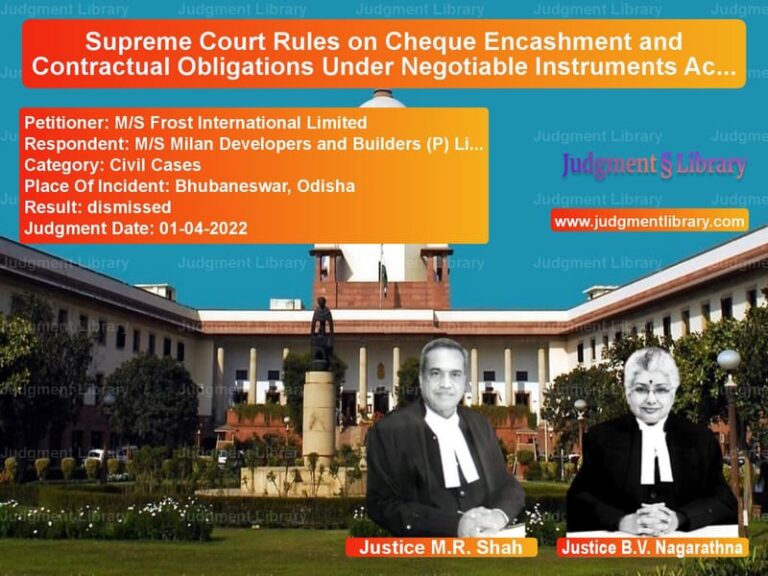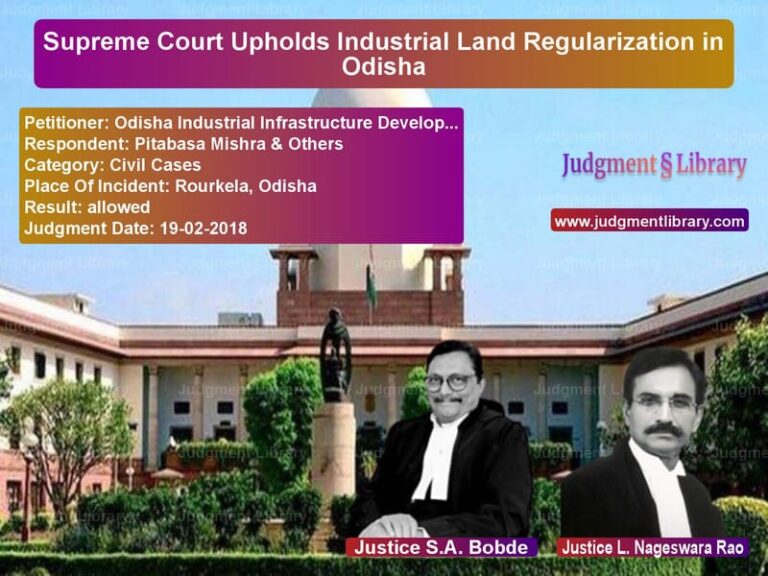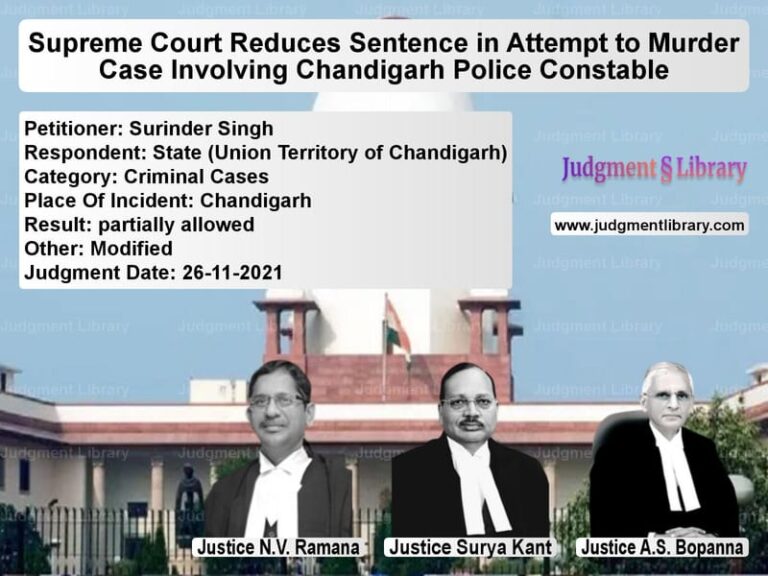Supreme Court Upholds Life Imprisonment in Maharashtra Family Dispute Murder Case
In a significant ruling, the Supreme Court of India in Baban Shankar Daphal & Ors. v. The State of Maharashtra upheld the conviction of the accused in a family dispute-related murder case. The Court dismissed the appeal filed by the accused, affirming the High Court’s decision that sentenced them to life imprisonment under Section 302 read with Section 34 IPC. The ruling reinforces the principle that minor contradictions in witness statements cannot outweigh strong eyewitness evidence.
Background of the Case
The case revolves around a long-standing property dispute in Brahamanwadi, Maharashtra, between two branches of the same family. The victim, Lalsaheb, had an ongoing land dispute with his brothers, Shankar and Hanmant. The situation escalated when the accused—Baban, Prakash, Suresh, and a cousin—attacked Lalsaheb following an argument regarding the sale of a neem tree. The assault occurred on September 26, 1987, near the victim’s house, where the accused ambushed him with wooden sticks and a metal rod. The victim sustained severe injuries and succumbed to them later that night.
The case was registered at the local police station, and an FIR was lodged the next day based on eyewitness testimonies. The prosecution built its case on the statements of the victim’s wife, Kamal (PW-3), daughter, Sushila (PW-4), and son, Sanjay (PW-7), who were present at the crime scene. They provided consistent testimonies about how the accused planned and executed the attack.
Trial Court and High Court Decisions
- The Trial Court, in its judgment dated March 3, 1994, acquitted all accused, citing inconsistencies in witness testimonies, unexplained delays in reporting, and lack of corroborative medical evidence.
- The High Court overturned this acquittal in a judgment dated August 25, 2015, convicting the four accused under Section 302 read with Section 34 IPC and sentencing them to life imprisonment.
Arguments by the Appellants
- The appellants argued that the Trial Court had correctly acquitted them based on weak evidence.
- They contended that the witnesses were interested parties (family members of the victim), making their testimonies unreliable.
- The appellants pointed out contradictions in the testimonies regarding the number of assailants and weapons used.
- They also claimed that the delay in lodging the FIR raised doubts about the prosecution’s version of events.
Arguments by the Respondents
- The prosecution maintained that the witnesses provided consistent and credible accounts of the attack.
- They argued that minor contradictions did not affect the core facts, as multiple witnesses independently confirmed the identity of the attackers.
- The medical report supported the prosecution’s claim that the victim suffered multiple blunt force injuries.
- The delay in filing the FIR was explained as a result of the victim’s family rushing him to the hospital first.
Supreme Court’s Observations
- “The law nowhere states that the evidence of an interested witness should be discarded altogether. It only warrants scrutiny with care and caution.”
- “Eyewitness testimonies are critical in criminal trials. If their statements are broadly consistent and corroborated by other evidence, they can form the basis of conviction.”
- “The High Court rightly concluded that the Trial Court had misapplied legal principles and ignored compelling eyewitness testimony.”
- “The conviction under Section 302 IPC read with Section 34 is justified as the attack was premeditated and involved multiple assailants acting in furtherance of a common intention.”
Final Judgment
- The Supreme Court dismissed the appeal and upheld the High Court’s judgment convicting the appellants.
- The life imprisonment sentence was confirmed.
- The Court reaffirmed that judicial interference in well-reasoned High Court rulings is unwarranted unless gross miscarriage of justice is demonstrated.
Conclusion
The Supreme Court’s decision reaffirms the judiciary’s stance on ensuring justice in cases of premeditated murder. The ruling emphasizes that minor inconsistencies in witness statements do not negate strong and corroborative evidence. The Court’s recognition of eyewitness testimony, despite familial ties, sets a precedent for handling cases involving family disputes leading to criminal offenses.
Petitioner Name: Baban Shankar Daphal & Ors..Respondent Name: State of Maharashtra.Judgment By: Justice Vikram Nath, Justice Prasanna B. Varale.Place Of Incident: Brahamanwadi, Maharashtra.Judgment Date: 22-01-2025.
Don’t miss out on the full details! Download the complete judgment in PDF format below and gain valuable insights instantly!
Download Judgment: baban-shankar-daphal-vs-state-of-maharashtra-supreme-court-of-india-judgment-dated-22-01-2025.pdf
Directly Download Judgment: Directly download this Judgment
See all petitions in Murder Cases
See all petitions in Bail and Anticipatory Bail
See all petitions in Judgment by Vikram Nath
See all petitions in Judgment by Prasanna Bhalachandra Varale
See all petitions in dismissed
See all petitions in Quashed
See all petitions in supreme court of India judgments January 2025
See all petitions in 2025 judgments
See all posts in Criminal Cases Category
See all allowed petitions in Criminal Cases Category
See all Dismissed petitions in Criminal Cases Category
See all partially allowed petitions in Criminal Cases Category







